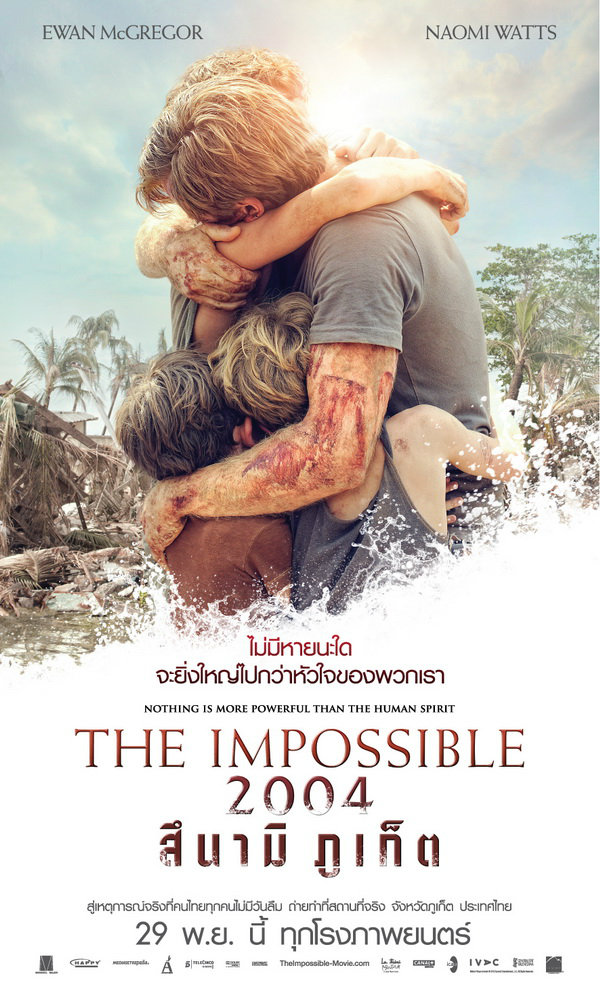the impossible หนังดีๆที่ไม่ทำเงินในไทย กับสิ่งที่ผมอ่านแล้วภาคภูมิใจ

หนังเป็นเรื่องเกี่ยวกับสึนามิบ้านเราตรงๆเลย หนังดีมากๆ แต่ก็เศร้ามากๆ ไดด้ชิงออสการ์ด้วย
หนังเดินเรื่องจากเค้าโครงเรื่องจริง ได้รับคำชมมากมายโดยเฉพาะนักแสดงนำ ว่าเล่นได้บีบคั้นอารมณ์มากๆ (ฉากที่ ยูน แมคเกรเกอร์โทรกลับบ้านนี่"ต้อง"ไปดูให้ได้อะ ผมแทบร้องไห้)
ตัวหนังไปหาดูกันเองรับรองไม่ผิดหวัง(หลายๆคนในนี้คงรู้อยู่แล้วล่ะ)
แต่เรื่องที่อ่านแล้วดีใจแทนคนไทยก็คือ ไปอ่านวิกิพีเดีย

มีเกร็ดย่อยเสริมว่า มีนักวิจารณ์คนนึง

กัดประมาณว่า หนัง

ดราม่าเว่อ แถมสร้างภาพ
ปลาดุกว่า เหยื่อสึนามิคนนึง

ส่ง จม ไปหา นสพนั้นเลย ข้อควายประมาณว่า
"ปกติผมไม่ใช่คนชอบขุดเรื่องในอดูดมาพูด แต่เห็นบางข้อความในนั้นแล้วขอบอกว่าอยากเตะปากคน
คือถ้าหนังเน้นแต่เรื่องวันหยุดสุดสัปดาห์ที่พังเพราะสึนามิ ผมจะไม่ว่าไม่เถียงเลย แต่นี่ตรงกันข้าม หนังเรื่องนี้ไม่ได้ให้ความสำคัญกับ"คนขาวผู้ร่ำรวย" แต่เต็มไปด้วยสำนึกแห่งความสามัคคี ความเป็นชุมชนและครอบครัว เหมือนดังที่ผม(ตอนนั้นอายุ16) และครอบครัวผมได้ประสบพบมาท่ามกลางหายนะนั้น
คนที่ลุยป่าฝ่าน้ำเข้าไปช่วยพวกเราพวกแรกคือชาวบ้านคนไทยนี่ล่ะ ที่ไปช่วยพวกเราออกมา ชาวบ้านทั้งนั้น พวกเขาเพิ่งสูญเสียทุกอย่าง พ่อแม่พี่น้อง ญาติๆ บ้านช่องทรัพย์สิน ธุรกิจ แต่สิ่งแรกที่พวกเขาทำคือช่วยนักท่องเที่ยว"
อ่านแล้วซึ้งอะ
นี่ข้อควายจากวิกิ
Response from Western victims
Simon Jenkins, a Western survivor, wrote to The Guardian, stating the film is "beautifully accurate". This was in response to critics commenting that the movie is "overdramatic" and "whitewashed". He says of the cynical comments, "As I must, I've never been the sort of person to revisit and analyze events of the past, but some of these articles frustrated me. Had this film been purely about the tale of a western middle-class family's "ruined" holiday then I would have agreed. For me, it was the exact opposite. Rather than concentrating on the "privileged white visitors", the film portrayed the profound sense of community and unity that I experienced in Thailand, with this family at the centre of it. Both for my (then) 16-year-old self and the Belon family, it was the Thai people who waded through the settled water after the first wave had struck to help individuals and families....The Thai people had just lost everything – homes, businesses, families – yet their instinct was to help the tourists".[28]



the impossible หนังดีๆที่ไม่ทำเงินในไทย กับสิ่งที่ผมอ่านแล้วภาคภูมิใจ
หนังเป็นเรื่องเกี่ยวกับสึนามิบ้านเราตรงๆเลย หนังดีมากๆ แต่ก็เศร้ามากๆ ไดด้ชิงออสการ์ด้วย
หนังเดินเรื่องจากเค้าโครงเรื่องจริง ได้รับคำชมมากมายโดยเฉพาะนักแสดงนำ ว่าเล่นได้บีบคั้นอารมณ์มากๆ (ฉากที่ ยูน แมคเกรเกอร์โทรกลับบ้านนี่"ต้อง"ไปดูให้ได้อะ ผมแทบร้องไห้)
ตัวหนังไปหาดูกันเองรับรองไม่ผิดหวัง(หลายๆคนในนี้คงรู้อยู่แล้วล่ะ)
แต่เรื่องที่อ่านแล้วดีใจแทนคนไทยก็คือ ไปอ่านวิกิพีเดีย
ปลาดุกว่า เหยื่อสึนามิคนนึง
"ปกติผมไม่ใช่คนชอบขุดเรื่องในอดูดมาพูด แต่เห็นบางข้อความในนั้นแล้วขอบอกว่าอยากเตะปากคน
คือถ้าหนังเน้นแต่เรื่องวันหยุดสุดสัปดาห์ที่พังเพราะสึนามิ ผมจะไม่ว่าไม่เถียงเลย แต่นี่ตรงกันข้าม หนังเรื่องนี้ไม่ได้ให้ความสำคัญกับ"คนขาวผู้ร่ำรวย" แต่เต็มไปด้วยสำนึกแห่งความสามัคคี ความเป็นชุมชนและครอบครัว เหมือนดังที่ผม(ตอนนั้นอายุ16) และครอบครัวผมได้ประสบพบมาท่ามกลางหายนะนั้น
คนที่ลุยป่าฝ่าน้ำเข้าไปช่วยพวกเราพวกแรกคือชาวบ้านคนไทยนี่ล่ะ ที่ไปช่วยพวกเราออกมา ชาวบ้านทั้งนั้น พวกเขาเพิ่งสูญเสียทุกอย่าง พ่อแม่พี่น้อง ญาติๆ บ้านช่องทรัพย์สิน ธุรกิจ แต่สิ่งแรกที่พวกเขาทำคือช่วยนักท่องเที่ยว"
อ่านแล้วซึ้งอะ
นี่ข้อควายจากวิกิ
Response from Western victims
Simon Jenkins, a Western survivor, wrote to The Guardian, stating the film is "beautifully accurate". This was in response to critics commenting that the movie is "overdramatic" and "whitewashed". He says of the cynical comments, "As I must, I've never been the sort of person to revisit and analyze events of the past, but some of these articles frustrated me. Had this film been purely about the tale of a western middle-class family's "ruined" holiday then I would have agreed. For me, it was the exact opposite. Rather than concentrating on the "privileged white visitors", the film portrayed the profound sense of community and unity that I experienced in Thailand, with this family at the centre of it. Both for my (then) 16-year-old self and the Belon family, it was the Thai people who waded through the settled water after the first wave had struck to help individuals and families....The Thai people had just lost everything – homes, businesses, families – yet their instinct was to help the tourists".[28]